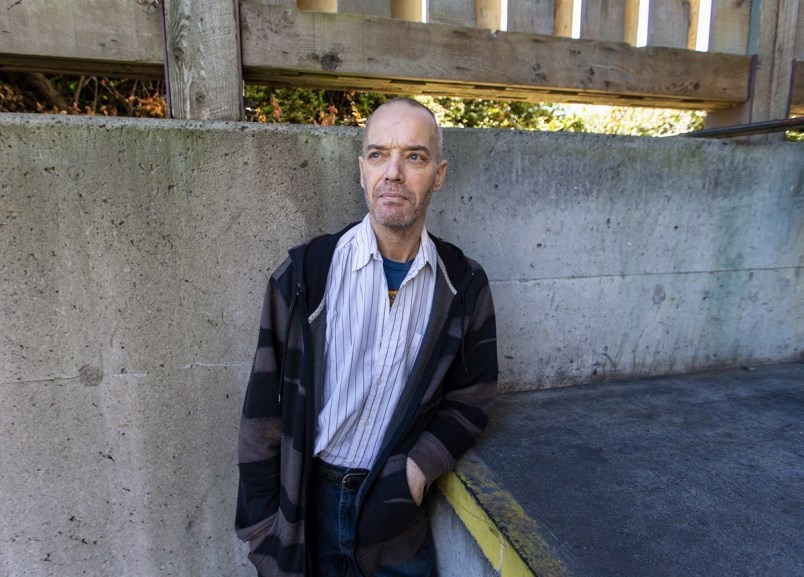A cancer patient living in subsidized housing has been told he can’t receive chemotherapy because his living conditions pose a risk to his recovery.
Terry Willis, 50, has a rare type of non-Hodgkin lymphoma, a cancer that starts in white blood cells called lymphocytes.
Since July 2017, he’s been living in Victoria in supportive housing at 844 Johnson St., a building managed by the Portland Hotel Society that houses many people who previously lived in the tent city on the lawn of the city's courthouse.
Willis was told by his oncologist that chemotherapy cannot start while he’s living in the building, because his compromised immune system would put him at high risk of infection.
“Mr. Willis is in urgent need of suitable housing, as his oncologist will not initiate chemotherapy for his B-lymphoplasmacytic lymphoma while he is living in his current accommodations,” says a letter written by a doctor with PHS Health Care on Sept. 11.
The letter was provided to Willis’s social worker, Hilary Marks, who is desperately trying to find Willis a home where he can receive treatment.
“I don’t want to die in there,” said Willis, who describes unsanitary conditions in the shared bathrooms, including feces in the shower. “That’s what’s going to happen if I don’t get treatment. It’s a non-curable cancer and it’s terminal.”
Grey Showler, director of the Victoria Cool Aid Society’s health and support services, said he has heard of cases in the past where living in shelters has prevented cancer patients from receiving chemotherapy.
“I think part of it is the number of other infections that might be present in that environment,” Showler said. He added that chemotherapy can cause nausea or diarrhea, so it’s important that patients have a private bathroom.
Cool Aid’s team of doctors and nurses has become acutely aware of the dearth of housing options for people who are seriously ill or dying, Showler said.
“It is a gap in our housing system.”
Cool Aid is working on turning two private apartments in a shelter, previously used for families, into palliative-care beds.
The society is waiting for funding to ensure medical staff is in place to care for the individuals living in those apartments.
Showler mused that one of the beds could be an option for Willis, but said he’s unsure when the funding will come through.
“That will be the first time ever in Victoria that there is a bed available for palliative care for people who are homeless or housed in a situation where they’re not able to access care,” Showler said.
Cool Aid has also partnered with social agencies such as Our Place and AIDS Vancouver Island to create a palliative outreach team, which is a group of social workers and nurses who arrange home visits, help people get to medical appointments and help them with errands.
“When people are dying or they’re medically compromised, a lot of the care is provided by friends and family,” Showler said. “They will take them to medical appointments, to the grocery store, clean their soiled linens. A lot of our clients don’t have that.”
Willis said since losing his wife, Sandra, to cancer two years ago, he’s been alone and trying to survive on the streets. Before moving into 844 Johnson, he spent a year and a half sleeping on mats at a church.
Willis was diagnosed with the stage 4 blood cancer in 2011. At the time, doctors estimated he had five years to live, but he underwent three years of chemotherapy and went into remission. Six months ago, the cancer came back.
At the time he was diagnosed, Willis had a well-paying job doing quality control in a warehouse. He and his wife lived in a nice rental home in Brentwood Bay with their four children.
“Then I got sick and lost everything,” said Willis, who is tall and thin with salt and pepper close-cropped hair and stubble on his gaunt cheeks. He has four tattoos with the first initial and birth date of each of his four children, but said he’s not in touch with his daughters and his son is living on the street.
Through his employer, Willis only had enough extended medical benefits to get him through 17 weeks.
Willis has been waiting for an apartment through the Centralized Access to Supported Housing program, in which several social agencies across Victoria pool housing applications in order to prioritize the most high-need individuals.
However, Don McTavish, Cool Aid’s manager of residential services and shelters, said there are 400 people on that waiting list.
“We say: ‘Of the people who fit the criteria, who are the most in need people today?’ and we do the best to get them in first,” McTavish said.
When asked about Willis’s situation, the Ministry of Housing said in a statement: “While we cannot comment on a client’s individual case due to privacy reasons, B.C. Housing actively works with health-care providers and our non-profit operators to ensure the needs of all residents are addressed. In a case like this, B.C. Housing would work with non-profit providers to find an alternate, suitable living situation for the tenant.”
With tears brimming in his eyes, Willis reflects on his situation with a mix of sadness and anger.
“The last place I want to die is the f***ing street. I didn’t ask for this cancer. I was a good parent, a good husband and next thing you know, everything is pulled away from you. I just need a clean place to lay my head.”



